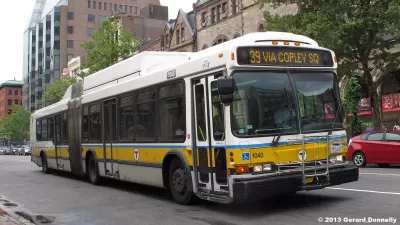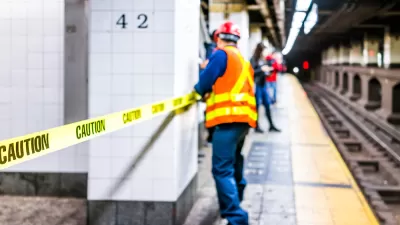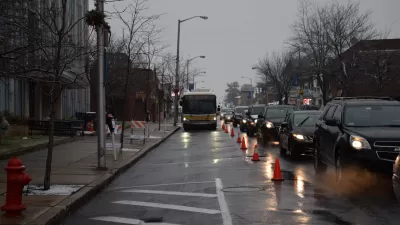A new Massachusetts Bay Transportation Authority program has quickly deployed bus infrastructure around the Boston area, focusing on neighborhoods where people are relying on the bus during the pandemic.

Cinnamon Janzer reports on the Rapid Response Bus Lanes program launched by the Massachusetts Bay Transportation Authority (MBTA), adding 14 miles of dedicated bus lanes in four regional municipalities (Boston, Chelsea, Somerville, and Everett).
"The 'Rapid Response' program can create new bus lanes, from planning to implementation, in roughly four months. That’s slightly faster than the average six to eight month time that the agency and its partner municipalities have been able to lay down lanes in the past," explains Janzer.
The program is offered as a benefit to riders impacted by reduced bus capacities and reduced service schedules during the pandemic—and specifically to provide efficient bus service to essential workers during the pandemic.
Since the beginning of the pandemic, low-income neighborhoods of color around Boston have held steady with ridership on public transit, while bus routes usually filled with high-wage earners heading downtown have been empty. The Rapid Response program was specifically designed to deliver first where ridership was likely to be durable during the pandemic, according to Janzer.
"To add an equity lens, [Eric] Burkman and [Melissa Duellea’s] teams used equity data from the Livable Streets Alliance and mapped that to the Rapid Response plans they were devising. This was used to 'truth check to make sure we weren’t accidentally being inequitable in our implementation,' Burkman says, as 'Boston region [riders] tend to be more people of color and primarily of lower incomes,'" writes Janzer.
FULL STORY: Boston Area Adds ‘Rapid-Response Bus Lanes’ for Pandemic Transportation

Planetizen Federal Action Tracker
A weekly monitor of how Trump’s orders and actions are impacting planners and planning in America.

San Francisco's School District Spent $105M To Build Affordable Housing for Teachers — And That's Just the Beginning
SFUSD joins a growing list of school districts using their land holdings to address housing affordability challenges faced by their own employees.

The Tiny, Adorable $7,000 Car Turning Japan Onto EVs
The single seat Mibot charges from a regular plug as quickly as an iPad, and is about half the price of an average EV.

Seattle's Plan for Adopting Driverless Cars
Equity, safety, accessibility and affordability are front of mind as the city prepares for robotaxis and other autonomous vehicles.

As Trump Phases Out FEMA, Is It Time to Flee the Floodplains?
With less federal funding available for disaster relief efforts, the need to relocate at-risk communities is more urgent than ever.

With Protected Lanes, 460% More People Commute by Bike
For those needing more ammo, more data proving what we already knew is here.
Urban Design for Planners 1: Software Tools
This six-course series explores essential urban design concepts using open source software and equips planners with the tools they need to participate fully in the urban design process.
Planning for Universal Design
Learn the tools for implementing Universal Design in planning regulations.
Smith Gee Studio
City of Charlotte
City of Camden Redevelopment Agency
City of Astoria
Transportation Research & Education Center (TREC) at Portland State University
US High Speed Rail Association
City of Camden Redevelopment Agency
Municipality of Princeton (NJ)





























